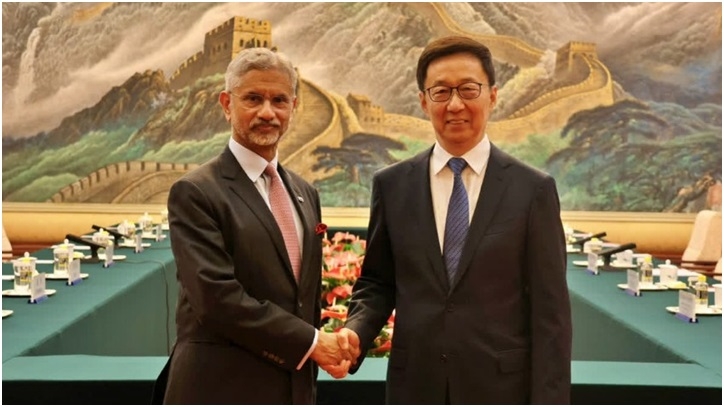Don’t Show Double Standards in Combating Terrorism: India’s Message To China Ahead Of SCO Meet
Total Views |

New Delhi : Ahead of the Shanghai Cooperation Organisation (SCO) Council
of Foreign Ministers’ meeting to be held in Tianjin, India has made it clear in
not so a subtle message to China that Beijing should not adopt double standards
when it comes to combating terrorism.
“Tomorrow, we will be meeting in the format of the SCO, whose primary mandate
is to combat terrorism, separatism and extremism,” External Affairs Minister S
Jaishankar said during his meeting with Chinese Foreign Minister Wang Yi in
Beijing on Monday. “This is a shared concern and India hopes that zero
tolerance for terrorism will be strongly upheld,” he said.
Jaishankar’s statement assumes significance as, only last month, India
refused to sign a joint declaration adopted after the SCO Defence Ministers’
meeting held in Qingdao, China, as it did not have any reference to the terror
attack in Pahalgam, Jammu & Kashmir, on April 22 perpetrated by
Pakistan-based terrorist groups.
Defence Minister Rajnath Singh refused to sign the statement after it
omitted the Pahalgam attack that killed 26 innocent civilians. What peeved
India was that while the statement omitted Pahalgam, it referred to militant
activities in Pakistan’s Balochistan province.
In his speech at the SCO Defence Ministers’ meeting, Singh had laid down
the broad contours of India’s transitional shift in its policy against
terrorism, calling upon the member countries to unite in eliminating the menace
for collective safety and security.
“Peace and prosperity cannot co-exist with terrorism and proliferation of
weapons of mass sestruction in the hands of non-state actors and terror
groups,” he had stated.
“Dealing with these challenges requires decisive action. It is imperative
that those who sponsor, nurture and utilise terrorism for their narrow and
selfish ends must bear the consequences. Some countries use cross-border
terrorism as an instrument of policy and provide shelter to terrorists. There
should be no place for such double standards. SCO should not hesitate to
criticise such nations,” Singh added.
The Defence Minister had asserted that India launched Operation Sindoor
in response to the heinous terror attack in Pahalgam exercising its right to
defend against terrorism and pre-empt as well as deter further cross border
attacks.
“During the Pahalgam terror attack, victims were shot after they were
profiled on religious identity,” he reminded the participants in the meeting.
“The Resistance Front, a proxy of UN-designated terror group Lashkar-e-Taiba
(LeT) claimed responsibility for the attack. The pattern of Pahalgam attack
matches with LeT’s previous terror attacks in India. India’s zero tolerance for
terrorism was demonstrated through its actions. It includes our right to defend
ourselves against terrorism. We have shown that epicentres of terrorism are no
longer safe and we will not hesitate to target them.”
The SCO is a Eurasian political, economic, international security and
defence organisation of 10 member states. It was established in 2001 by the
China, Kazakhstan, Kyrgyzstan, Russia, Tajikistan and Uzbekistan. In June 2017,
it expanded to eight states, with India and Pakistan. Iran joined the group in
July 2023, and Belarus in July 2024. Several countries are engaged as observers
or dialogue partners.
The SCO is primarily centred on security-related concerns, describing the
main threats it confronts as being terrorism, separatism and extremism. It has
addressed regional human trafficking and weapons trafficking and created
terrorist blacklists. At the SCO summit held in
Tashkent, Uzbekistan, in 2004, the Regional Anti-Terrorist Structure (RATS) was
established. On April 21, 2006, the SCO announced plans to fight cross-border
drug crimes under the counter-terrorism rubric.
In October 2007, the SCO signed an agreement with the Collective Security
Treaty Organisation (CSTO) in the Tajik capital of Dushanbe to broaden
cooperation on issues such as security, crime, and drug trafficking.
As of 2010, the organisation was opposing cyberwarfare, saying that the
dissemination of information “harmful to the spiritual, moral and cultural
spheres of other states” should be considered a “security threat”. An accord
adopted in 2009 defined “information war”, in part, as an effort by a state to
undermine another’s “political, economic, and social systems”.
It is in this context that Jaishankar’s remarks during his meeting with Wang
Yi assumes significance. By voicing “zero tolerance” ahead of the upcoming SCO
Foreign Ministers’ meeting, India stakes out a firm stance that cross-border
terrorism will no longer be tolerated, aligning with its actions post-Pahalgam.
According to Ash Narain Roy, Director of the New Delhi-based Institute of
Social Sciences (ISS), China is trying to use the SCO or any other platform to
spite India.
“So, Jaishankar is trying to pre-empt what happened during the SCO
Defence Ministers’ meeting,” Roy, who last week attended the SCO Digital
Economy Forum in Tianjin, told ETV Bharat. “But it is possible that the same
story might be repeated during the SCO Foreign Ministers’ meeting. However,
even if some space is given to India, even partially, it should be seen as an
advancement. Jaishankar is trying to send a strong message to the SCO.”
MS Prathibha, Associate Fellow at the East Asia Centre in the Manohar
Parrikar Institute of Defence Studies and Analyses, concurred.
“What India is
saying is that if you can condemn all terror attacks, why can’t you condemn
Pahalgam,” Prathiba told ETV Bharat. “India is urging China not to show double
standards when it comes to combating terrorism.”
She said that what India is indicating is that what is the point of being
a part of a multilateral forum when there are double standards in dealing with
the menace of terrorism.
In essence, Jaishankar’s statement is both symbolically and strategically
crucial. It transforms the response to a tragic event – the Pahalgam massacre -
into a broader regional and international framework, pushing for sustained
collective pressure against terrorism at the SCO.

